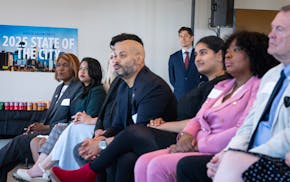Opinion editor's note: Strib Voices publishes a mix of material from 11 contributing columnists, along with other commentary online and in print each day. To contribute, click here.
•••
Life is an unfolding series of endless surprises: some bad, some good. The only certainty, of course, is birth and death. What happens in between is part up to chance, part up to us. As for the surprises, there's a potential good that can come when we acknowledge and embrace them. Here's one recent example of how that happened for me.
On Friday, I attended the Religious Freedom Champions Dinner honoring longtime Minnesota Sen. John Marty, DFL-Roseville, who like me comes from a family of Lutheran pastors. We, two lifelong Lutherans, were both invited by HumanistsMN, a "secular community that promotes ethical living, widespread human flourishing, and a healthy planet through its commitment to science, reason, compassion and creativity."
These are not the non-religious folks I was warned about while growing up Christian in the '90s and early aughts.
Back then, especially when I attended evangelical church camp, youth group, and young adult Bible studies, we were warned about pernicious "atheists," who would scorn our God and try to convince us away from our faith. Then, the image I had in my mind of a non-religious person was almost always a man of privilege — people like infamous atheist academics Christopher Hitchens and Richard Dawkins. They were sneering, cynical and arrogant, opposed to religion on the basis of a godless struggle to win the world, running over anyone who got in their way. This was what I thought; what we were taught.
Then I went to a Lutheran seminary, got ordained as a Lutheran pastor after years as a sportswriter (where I often heard God invoked on the field and the court) — and I learned that the view of the religious toward secular people had shifted a bit. Now, they were called "the nones," and they were referred to both as a mission field and a threat. Their growth meant that fewer and fewer people were attending church services each week, an existential issue for those who were attending graduate school and paying tuition on the hopes of a career in ministry.
But something has shifted again, drastically, since those days, at rapid pace specifically in the past eight years since President Donald Trump was first elected in 2016 and has now been re-elected in 2024.
That shift was illustrated brilliantly in a 2024 interview with the once-prominent atheist, now 83-year-old, Dawkins.
The author of the "God Delusion" told Britain's LBC News: "I call myself a cultural Christian. I'm not a believer, but there's a distinction between being a believing Christian and being a cultural Christian. … I love hymns and Christmas carols, and I sort of feel at home in the Christian ethos. … We [in the U.K.] are a 'Christian country' in that sense."
It is an indictment of the current state of western white Christianity that it's been so easily reduced, stripped of its theological and social convictions, to "hymns and Christmas carols." But that's exactly what surveys show, formal and informal. Into that vacuum has flooded a right-wing political American-ized Christianity focused on exclusionary social issues. Ask your neighbor or the next person you see out in the world what they'd imagine defines American Christians. You are most likely to hear about conservative politics and social issues, and also an oblique nod to a sort of throwback culture regarding human sexuality, gender norms and, certainly, coded language around race that rejects support of diversity, equity and inclusion.
It's no surprise that these developments around Christianity, making it possible for a prominent atheist to declare his allegiance to "cultural Christianity" have risen alongside Trump's presidency and popularity, especially among white American Christians who voted for him again in record numbers in 2024, propelling him to the presidency with gains as well among Hispanic Christians and white women.
White Americans who identify as Catholic, evangelical or mainline Protestant all voted in majorities for Trump. Trump won white women, led by support of Christian women, even though he was running against the potential first female president, and even though his first administration was made up of abortion hardliners who vowed to restrict reproductive rights.
All this from a man who rarely attends church, who famously claimed he had nothing for which to ask forgiveness, who called communion a "little cracker," and who used the Bible as a prop as he marched down the streets of Washington, D.C., in the wake of George Floyd's murder.
Trump's Christian supporters continue to be those most interested in the grift. On Monday at Trump's inauguration, the Rev. Lorenzo Sewell of 180 Church in Detroit gave a prayer. Hours later, Pastor Sewell announced on X that he'd launched his own crypto token, following Donald and Melania's lead.
It's enough to make the head of a Lutheran pastor, whose Lutheran pastor grandfather told her that Christians were called to eschew wealth and give instead to the poor, spin.
Still on Friday, there I sat with a Methodist, a Lutheran, a Jew and three secularists at the dinner. Marty told the crowd about how he'd come home from church one Sunday a few years ago to find out he'd become the target of right-wing pundits and online trolls, including (among the former) Pete Hegseth, a Minnesota native and Trump's nominee for the secretary of defense.
My heart burned in recognizance as Marty recounted how both the people online, on Fox News, and some of his colleagues in the Legislature claimed he was against God for challenging a bill that was put forward requiring that the words "In God We Trust" be posted prominently in Minnesota's public schools. I, too, have often been the target of that kind of online harassment, usually from fellow Christians.
Marty opposed the bill because it violated the establishment clause of the Constitution, which lays out the requirement of religious freedom in America. It's that same religious freedom that allowed our Lutheran ancestors to worship as they desired as a minority religious sect. It's the same religious freedom Jesus himself championed in interactions with religious minorities like the Samaritans in the Bible. And practically, it's those same countries who have official state churches (such as in Europe) who have some of the lowest religious adherence rates in the world.
If I were a Minnesota legislator evaluating that bill, I'd oppose it because my Christian faith is not rooted in America; I recognize that to try and American-ize Christianity is to rob it of its particular history, of a Jewish Jesus born in the Middle East with brown skin.
The day after that dinner, I sat on a panel discussion in Minneapolis as part of the Religious Freedom Day Forum, again put on by HumanistsMN.
Again, I found myself alongside allies who I once had thought would hate me, would want nothing to do with me, and would find me stupid for my religion.
Instead, when I talked with the people attending the forum, I found humility, openness and a desire to work together. There were many people who'd grown up churchgoers but had been hurt by the church's hypocrisy or treatment of them, or people they'd loved. These were stories I recognized and lamented.
I was humbled that, despite the ways organized religion had hurt many in this room, they welcomed me as a pastor with open arms.
In the words of HumanistsMN President Ellie Haylund: "Although we are a secular organization, we are not anti-religion. We see you all as allies, and we are so glad you're here."
Her words meant a lot to me. I would hope that as religious leaders seeking to work together for a more compassionate and honest country, we could say those same words back to the people we've too often derisively called "the nones."
As I wrote at the top of this column, life is full of surprises. I never would have thought that my faith in God would lead me to a group of people who question God's existence. But here I am; let's get to work.

Rash: At home, Jake Sullivan reflects on events abroad

Opinion: Let's not lose sight of what's best for older adults

Readers Write: Minneapolis politics, Trump's budget, hot tub rentals
